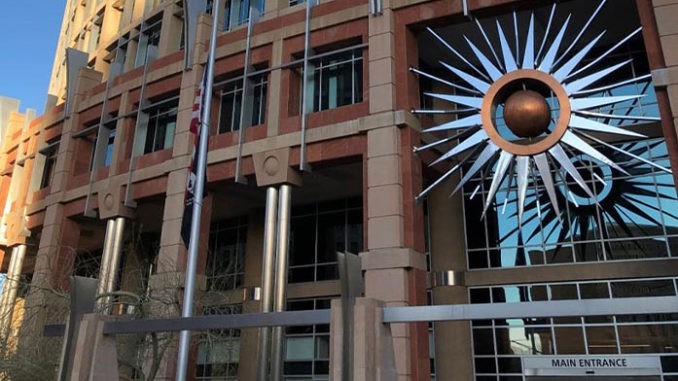
by Terri Jo Neff | Jul 14, 2021 | News
By Terri Jo Neff |
Attorneys for the Goldwater Institute and the City of Phoenix will be in court Wednesday to argue over whether government workers subjected to a collective bargaining agreement can be forced to finance union activities, including a union’s political endeavors.
The issue before Judge Daniel Martin of the Maricopa County Superior Court is a legal challenge brought on behalf of two city employees over a practice known as “release time” approved by the Phoenix City Council in 2019. Release time allows some city employees to be paid to work for their private union instead of working for the public.
Employees utilizing release time are allowed to engage in activities such as lobbying, union membership drives, filing grievances against the employer, and wage and benefit negotiations. Release time activities of city employees are subject to the discretion and control of the union, not the city which pays the employees.
In May 2019, the City of Phoenix signed a Memorandum of Understanding (MOU) with the American Federation of State, County, and Municipal Employees, Local 2384, Field Unit II (AFSCME) which serves as the exclusive bargaining unit for a wide range of public workers, including but not limited to electricians, mechanics, security guards, street technicians, and maintenance workers.
AFSCME is the nation’s largest public services employees union with more than 1.3 million working and retired members. The MOU applied to all City of Phoenix employees assigned under Field Unit II whether union members or not, and it provides for myriad release time benefits, including four full-time release positions.
“That means that four city employees are released full-time to work exclusively for the union at the public’s expense,” according to the Goldwater Institute, which also noted nearly 3,200 additional paid work hours are available to other union representatives. That is roughly equivalent to 80 weeks of full-time work.
The MOU between Phoenix and AFSCME also guarantees compensatory time for high-ranking union officials using release time, as well as additional hours and payment for AFSCME members who attend union seminars, lectures, conventions, and workshops.
In October 2019, attorneys with the Goldwater Institute sued the City of Phoenix on behalf of two Field Unit II city employees who contend the release time salaries and benefits in the MOU are funded by all government employees of a specific bargaining unit.
The result, the lawsuit argues, is that non-union members are forced to fund union activities in violation of the First Amendment to the U.S. Constitution, along with Arizona’s Right to Work laws and other state constitutional provisions, the employees contend. The lawsuit also contends the four full-time release time employees “are not contractually required to provide an accounting to the City for how they use release time.”
Judge Martin will hear oral arguments Wednesday and Friday in dueling motions for summary judgment filed by the parties. Court records show AFSCME has been granted intervenor status in the case.
Among the organizations also opposed to release time policies is the American Legislative Exchange Council (ALEC) which has developed draft legislation that lawmakers across the country can use in an effort to ban paid union activity by public employees.
Under the ALEC draft legislation, it would be “against public policy” for a public employer like the City of Phoenix to enter into a deal with any private union to compensate a public employee for union activities.
“While public employees should not be prohibited from freely associating outside of their employment duties, including hiring individuals to help represent their interests, this should occur at public employee, not taxpayer, expense,” according to the ALEC website.

by AZ Free News | Jul 14, 2021 | News
Governor Doug Ducey on Tuesday expressed serious concerns regarding reports that the Biden Administration could soon lift Title 42 border restrictions.
“I urge you to keep these restrictions in place. Lifting them will threaten the health and safety of not only Arizonans, but all Americans, and our already broken border will explode, overwhelming border patrol, law enforcement, non-profits and health care professionals,” the Governor wrote to U.S. Department of Homeland Security Secretary Alejandro Mayorkas and Centers for Disease Control and Prevention Director Rochelle P. Walensky. “By lifting this policy, the Biden administration will be responsible for not only exacerbating our border crisis, but in effect, proactively and knowingly importing COVID-19 variants into the United States, starting in our border states.
The Governor is urging Secretary Mayorkas and Director Walensky not to lift a public health rule known as Title 42, which allows federal officials to prohibit the entry of those who potentially pose a health risk, including COVID-19. There are reports that the Biden Administration will lift these restrictions, endangering the health and safety of law enforcement professionals, health care personnel, border communities and all Arizonans.
“Title 42 is one of the only measures remaining in place which allows not only the federal authorities but also state and local public health professionals to maintain public health that they have worked so hard for over the past 17 months of this pandemic,” Governor Ducey wrote.
The letter comes as the Wall Street Journal is reporting “the pandemic is raging in South America, which has just 5% of the world’s population but now accounts for a quarter of the global death toll.”
On June 30, Governor Ducey signed Arizona’s FY 2022 budget, which includes $25 million for the Arizona National Guard Border Mission. It also includes $30 million to assist local and county law enforcement with border security costs, in addition to the existing state support for the Border Strike Force mission.
On June 10, Governors Ducey and Greg Abbott, of Texas, urgently requested all U.S. governors to send available law enforcement resources to their states along the U.S.-Mexico border as illegal border crossings, apprehensions and unaccompanied migrant children in federal custody increase.
On May 11, Governor Ducey joined 19 fellow governors to issue a letter calling for President Joe Biden and Vice President Kamala Harris to reverse their destructive policies that have created the crisis at the southern border.
On April 29, The State Emergency Council, convened by Governor Ducey, voted to allocate up to $2,536,500 from the Governor’s Emergency Fund to help fund the Arizona National Guard border mission. The Council also approved an additional $200,000 for the Search and Rescue Fund to support county sheriffs.
On April 20, Governor Ducey issued a Declaration of Emergency and announced he is deploying the Arizona National Guard to the state’s southern border to support local law enforcement efforts as the nation experiences a rapid increase in apprehensions and migrant children in federal custody.
The following day, Governor Ducey and a delegation of state lawmakers toured Arizona’s border in Yuma and received a briefing on the escalating humanitarian and security crisis from Border Patrol, local law enforcement and community leaders.
On March 24, Governor Ducey while visiting the University of Arizona criticized President Biden and Vice President Harris’ lack of focus on the situation at the border.
On March 19, Governor Ducey traveled to Douglas to get a first-hand view of the situation at the border. After taking an aerial border tour, the Governor received a briefing and held a press conference and a border security roundtable.

by AZ Free News | Jul 14, 2021 | News
PHOENIX — A banner supporting the Phoenix Suns basketball team is displayed atop the Arizona State Capitol to support the team as they compete in the National Basketball Association (NBA) 2021 Finals.
This is the first time the Phoenix Suns have made it to the NBA Finals since 1993. These Finals games have set 20-year TV viewership records in the Phoenix area, according to the NBA. The Phoenix Suns previously competed in the NBA Finals twice before. This year would be their first championship win. The Suns have the second-highest winning percentage of any team that has not yet won an NBA championship.
The large, colorful banner is more than 30 feet wide and will hang from the Arizona State Capitol Executive Tower through the end of the Finals. It can be seen from the east side of the Capitol complex from downtown Phoenix.
Governor Doug Ducey also announced the Capitol dome will be lit in the Phoenix Suns team colors of purple and orange beginning tonight at sundown.
“Arizona is fired up and rooting for the Suns this week as they compete in the NBA Finals,” said Ducey in a press release. “The Phoenix Suns have assembled one of their strongest lineups in recent memory and have an incredible record going into these final games. All of Arizona is behind them and with this banner, we’re showing our support here at the State Capitol. Let’s go Suns!”
After winning the first two Finals games in Phoenix, the Suns are facing off against the Milwaukee Bucks for Game Four on Wednesday night. Fans will be cheering on the Suns throughout Arizona as they work to overcome Sunday night’s loss and win in Milwaukee Wednesday. The Suns will return to the Phoenix Suns Arena in Phoenix on Saturday for Game Five.

by Terri Jo Neff | Jul 13, 2021 | News
By Terri Jo Neff |
When Gov. Doug Ducey signed Senate Bill 1820 last month, general contractors, construction companies, and construction-industry support businesses had a lot to be happy about given the more than $80 million appropriated for capital projects by several state agencies.
Among the most expensive projects funded by SB1820 are $5 million to Yuma County for military installation preservation and enhancement by relocating the Yuma Fairgrounds, nearly $12 million to restore and renovate the historical capitol building, and $25 million for the Arizona Department of Veterans’ Services to construction a veterans’ home in northwest Arizona.
Other capital project appropriations are $4 million for maintenance to the Attorney General building on 15th Avenue, $3.5 million for repairs to the House of Representatives and Senate buildings, $3.1 million for construction of a new Arizona Department of Transportation (ADOT) maintenance facility in Wickenburg, $3 million for construction of a wellness and training center for the Arizona Department of Public Safety, and $2.8 million for demolition or conversion of state-owned buildings on West Jefferson Street.
There is also $2.5 million allotted for a nonprofit organization to construct an international dark sky discovery center, $2.5 million for new doors at the Arizona Department of Juvenile Corrections’ Adobe Mountain School Facility, and $2 million to demolish unused buildings on the Arizona State Hospital campus.
Many smaller capital projects are included, such as improvements at the Town of Taylor rodeo arena, replacement of the fire alarm system in the Arizona Veterans Memorial Coliseum, construction of brine tanks for ADOT in Globe, Keams Canyon, Prescott Valley, and Show Low, and replacement of ADOT vehicle fueling facilities in Flagstaff, Holbrook, and Kingman.
The appropriations also included money to fund several projects for the Arizona State Parks Board, including construction of an amphitheater building at Dead Horse Ranch State Park in Cottonwood, replacement of discovery center roof at Kartchner Caverns State Park in Benson, replacement of the fire suppression system and a maintenance building at Red Rock State Park in Sedona, as well as construction of a new park at the Rockin’ River Ranch Park in Camp Verde.
Funding for a major fire safety upgrades at the Arizona State Prison Complex – Eyman in Florence was also included in the new budget. The more than $25.5 million project will receive monies from the state’s General Fund, the Arizona Correctional Industries Revolving Fund, the Special Services Fund, the Inmate Store Proceeds Fund, and the Prison Construction and Operations Fund.
The FY 2022 budget also includes appropriations for several building renewal projects, including more than $22 million from the state’s General Fund for the Arizona Department of Corrections (ADC), which is on top of nearly $6 million from ADC’s own Building Renewal Fund.
Another $6.2 million of state General Fund monies was appropriated for the Arizona Department of Administration (ADOA) to be spent on major maintenance and repair activities for state buildings. That will be added to $18 million from the Capital Outlay Stabilization Fund.
Among other building renewal appropriation include $1.2 million to Arizona Game and Fish Department and $15.4 million from the State Highway Fund for use by ADOT.
In most instances, the monies come with restrictions or requirements. ADOA is required to provide two reports -in November 2021 and May 2022- to the Joint Legislative Budget Committee (JLBC) on the status of all capital projects and expenditures. The same requirement applies to ADC, AZGFD, and ADOT.
And in a use it or lose it provision, any unexpended building renewal appropriations as of June 30, 2023 revert back to the fund from which they were appropriated.

by AZ Free News | Jul 13, 2021 | News
On Monday, Reps. Andy Biggs and Barbara Lee, sent a letter to President Biden questioning the administration’s decision to conduct offensive airstrikes on the Iraq-Syria border. The two Representatives raised questions as to the constitutionality and necessity of the strikes.
As noted in their letter, “on June 27, 2021, the Department of Defense (DOD) announced that the U.S. had conducted a military operation against operational and weapons storage facilities in Iraq and Syria. The DOD’s announcement stated, “[a]t President Biden’s direction, U.S. military forces earlier this evening conducted defensive precision airstrikes against facilities used by Iran-backed militia groups in the Iraq-Syria border region.”
The Representatives claim that the DOD announcement “contained little specific information about what threat precipitated this strike.”
According to Biggs and Lee, Congress “remains underinformed” about said threat.
“Our Constitution gives the authority to declare war only to Congress. It is implied that the President has limited authority to act to defend our national interests in exigent circumstances. The Executive Branch has no authority conducting offensive strikes without Congressional approval. The Biden Administration has taken offensive action in the recent airstrike on the Iraq-Syria border without bringing this to Congress for approval. Without appropriate justification of an imminent threat to the United States, it is clear that President Biden exceeded his constitutional authority,” said Biggs in his announcement.
Full letter below:
July 12, 2021
President Joseph R. Biden, Jr.
The White House
1600 Pennsylvania Ave., NW
Washington, D.C. 20500
Dear President Biden,
The recent U.S. airstrikes on the Iraq-Syria border raise major constitutional concerns. We request that you brief Members of Congress on the threats faced by our troops overseas and the specific imminent threat that precipitated this use of military force.
On June 27, 2021, the Department of Defense (DOD) announced that the U.S. had conducted a military operation against operational and weapons storage facilities in Iraq and Syria. The DOD’s announcement stated, “[a]t President Biden’s direction, U.S. military forces earlier this evening conducted defensive precision airstrikes against facilities used by Iran-backed militia groups in the Iraq-Syria border region.” The DOD announcement contained little specific information about what threat precipitated this strike. In the weeks since the attack, Congress remains underinformed about said threat.
When President Trump conducted the airstrike that killed Qasem Soleimani in January 2020, you said that his administration’s assertion that the strike was conducted in self-defense was not adequate because his administration did not supply “the necessary evidence to support that conclusion”. Your administration’s claim that this recent action was necessary to defend our troops likewise must be accompanied by evidence necessary to support the conclusion that our troops were in danger in this instance.
In your notification to Congress, you said, “I directed this discrete military action consistent with my responsibility to protect United States citizens both at home and abroad and in furtherance of United States national security and foreign policy interests, pursuant to my constitutional authority to conduct United States foreign relations and as Commander in Chief and Chief Executive.” The Constitution of the United States gives Congress the power to declare war, and the president the power to prosecute the war. The Constitution does not give the president, as “Commander in Chief,” unlimited power to make war. As President Washington put so eloquently, “The constitution vests the power of declaring war in Congress; therefore, no offensive expedition of importance can be undertaken until after they shall have deliberated upon the subject and authorized such a measure.” Article II of the Constitution only gives the President the power to repel immediate or imminent threats, it does not give the Executive Branch the power to conduct a war without congressional approval.
We would appreciate a written reply to the following questions:
- What notification did the administration provide to Members of Congress before launching this airstrike?
- What immediate threat did our troops face that drove the conclusion that immediate military action was the necessary and appropriate response?
- How does your administration define “immediate” or “imminent” when assessing threats?
- Do you believe that Article II gives the Executive Branch unlimited power to decide when to engage in military strikes in foreign nations? Why?
If these questions cannot be provided in written form due to national security concerns, we request a classified briefing in which the information can be shared. We look forward to hearing from you ahead of August 1. Thank you for your prompt response, and your willingness to work with us to restore Congress’ preeminent Constitutional role over decisions of war and peace.
Sincerely,
Andy Biggs
Member of Congress
Barbara Lee
Member of Congress

by AZ Free News | Jul 13, 2021 | News
A State Grand Jury has indicted Tracey Kay McKee, of Scottsdale, with one count of Illegal Voting and one count of Perjury, for allegedly casting a vote in the name of a deceased person through an early ballot in the 2020 General Election.
The indictment alleges that McKee signed the name of a deceased individual to an early ballot envelope. McKee is the daughter of the deceased individual, who died on October 5, 2020. McKee is accused of signing her deceased mother’s name to a declaration made under penalty of perjury on an early ballot envelope on or between October 7, 2020, and November 3, 2020.
McKee’s next court appearance is set for August 11, 2021, in Maricopa County Superior Court.






